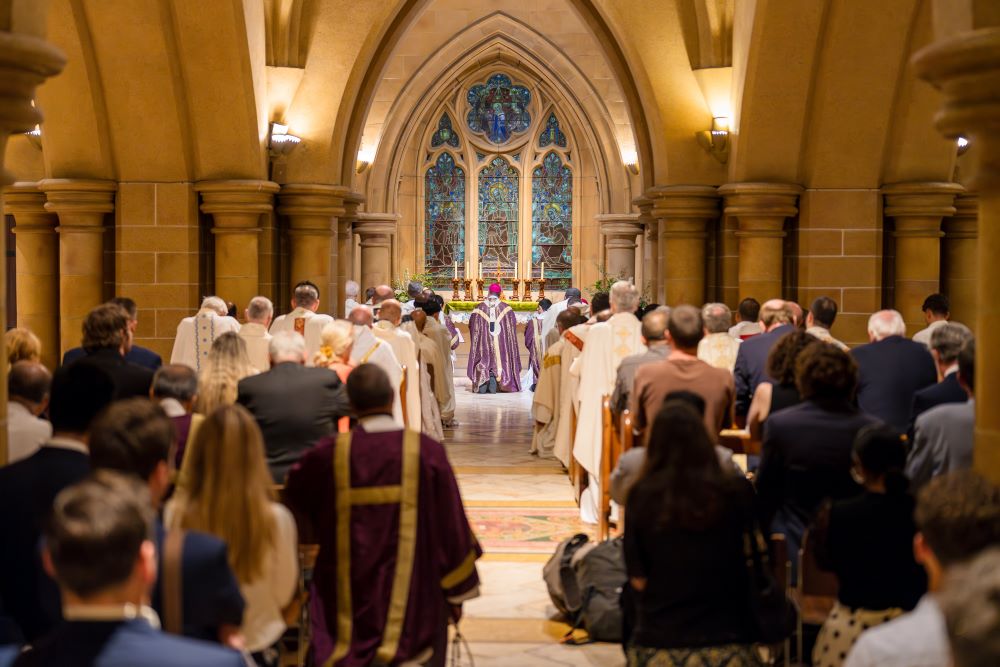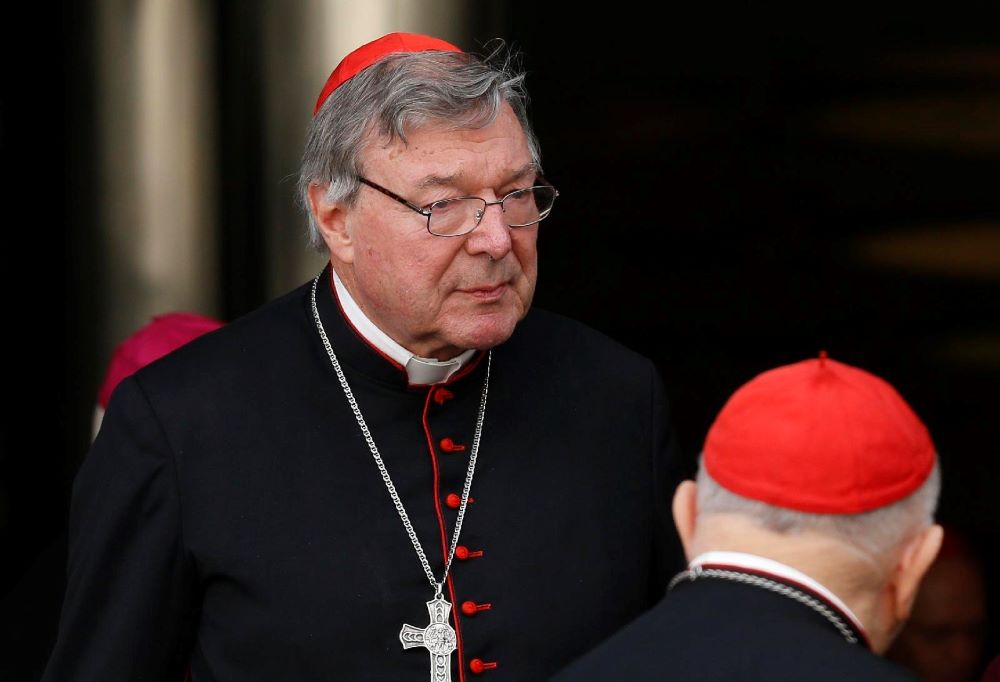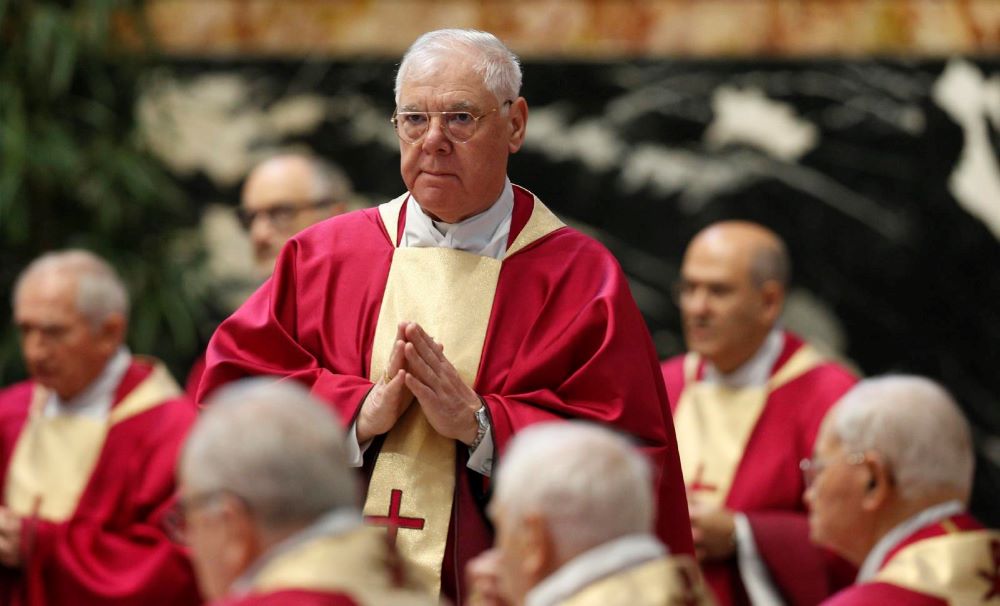
Archbishop Anthony Fisher of Sydney, principal celebrant, prays at a memorial Mass for Cardinal George Pell Jan. 10, a year after Pell died at 81. Another Mass for Pell took place Jan. 9 in Rome, celebrated by the former head of the Vatican's doctrine office, German Cardinal Gerhard Müller. (OSV News/The Catholic Weekly/Patrick Lee)
When Australian Cardinal George Pell died unexpectedly of a heart attack following hip replacement surgery on Jan. 10, 2023, it came less than two weeks after the death of retired Pope Benedict XVI and only compounded the grief of those longing for a return to a more traditional brand of Catholicism.
A year later, those sentiments were still palpable at a Jan. 9 Requiem Mass for Pell here in Rome, celebrated by the former head of the Vatican's doctrine office, German Cardinal Gerhard Müller, who recalled those disorienting days after the back-to-back deaths of Pell and the late pope.
Müller heralded the two churchmen as models of the "true faith" who are now "powerful advocates with the Father" at a time in the church where he said its current leaders are too willing to accommodate the "changing spirit of the times."

Cardinal George Pell is pictured during the extraordinary Synod of Bishops on the family at the Vatican in this Oct. 16, 2014, file photo. He died Jan. 10, 2023, at 81.(CNS/Paul Haring)
The Mass, celebrated at the Domus Australia — a guesthouse in Rome for Australian visitors, whose creation was spearheaded by Pell and officially opened by Pope Benedict XVI in 2011 — included an exquisite scola, some 50 lay attendees and six cardinals, including traditionalist U.S. Cardinal Raymond Burke.
Pell and Müller weren't just neighbors at their Vatican apartments in the Piazza della Città Leonina, but also reliable ideological allies. In his final article, Pell warned that Pope Francis' emphasis on synodality — an effort to decentralize the Catholic Church and better include all its members — had become a "toxic nightmare." Similarly, Müller has described it as a "hostile takeover" of the church.
During his homily on the evening of Jan. 9, Müller tipped his red hat to Pell's strong commitment to the church's teaching on marriage and family, particularly in the face of "secularly minded" participants in the synod process.
Müller also acknowledged Pell's controversial legacy on clergy abuse. The last two decades of Pell's life were overshadowed by charges from abuse survivors and the Australian government that he was callous and neglectful in his handling of such cases. But Müller remembered the Australian cardinal for what he called Pell's "exemplary" treatment of victims of clergy sex abuse.
Referring to Pell's 2018 conviction in Australia on charges of child sexual abuse, for which the cardinal served 404 days in jail before the country's High Court unanimously reversed the decision in a 2020 ruling, Müller said Pell was a "victim of injustice" at the hands of "anti-Catholic agitators."
At the Requiem Mass, Müller praised Pell's prison memoirs as essential spiritual reading. Other friends have remembered the brash and outspoken cardinal as a "modern-day saint" and martyr for how he handled the situation.
After his release from prison, Pell returned to Rome, where he had been previously serving as the pope's economic czar and a member of his advisory Council of Cardinals. Pell had already turned 80, thereby losing the right to vote in a future conclave. He had become publicly disgruntled about the direction Francis was taking the church and was actively strategizing for what he believed to be an imminent papal election.

Cardinal Gerhard Müller attends the funeral Mass for Australian Cardinal George Pell in St. Peter's Basilica at the Vatican in this file photo from Jan. 14, 2023. During his homily at the Jan. 9 requiem Mass, Müller tipped his red hat to Pell's strong commitment to the church's teaching on marriage and family. (CNS/Paul Haring)
As a retired cardinal, Pell went on to fuel rumors that Francis had an underlying health condition that would soon lead to his demise. He also was revealed to be the primary author of a popular memo that circulated here in Rome describing the Francis papacy as a "catastrophe."
Last year, in Hungary, conservative American writer Rod Dreher, who dined with the cardinal shortly before his death, told me that Pell had identified Budapest's Cardinal Peter Erdo as his candidate of choice.
Erdo, Dreher recalled Pell telling him, is "a very fine canon lawyer and this place [Rome] is lawless."
A former Australian rules football player, Pell aired his grievances about the current pontificate in a manner and style that was singularly his own, all the way to the end.
Over the last month, a number of incidents have brought into even sharper focus just how deep these internal divisions about the future of the church run, especially among some of the pope's own cardinals.
In December, reports surfaced that Francis was removing the Vatican apartment and monthly stipend of Burke, viewing the American cardinal as a source of "disunity" in the church. Tensions became even more apparent when on Dec. 18, the Vatican's doctrinal office, now led by the pope's longtime Argentine collaborator Cardinal Víctor Manuel Fernández, issued a controversial document allowing priests to offer simple blessings to couples in same-sex unions.
Advertisement
Pell's old allies, such as Müller and Cardinal Robert Sarah, were among the first to respond, calling the document "blasphemous" and verging on "heresy." Meanwhile, Fernández himself has come under fierce scrutiny over an eyebrow-raising graphic book he wrote on sex and spirituality when he was a young priest a quarter century ago.
Pell's closest friends praised him as someone who, in life, was a physical giant who didn't mind throwing his elbows around in the church and who would always speak his mind for the sake of what he believed to be true.
In death, as this week's requiem Mass reminded, Pell continues to be celebrated as someone who fought to the end for the future of the church as he envisioned it, even if his unconventional tactics risked fracturing it further.
And as the contest for the next conclave continues to heat up — whenever that may be — these very public fissures will only be on greater display. Memory eternal, indeed.








